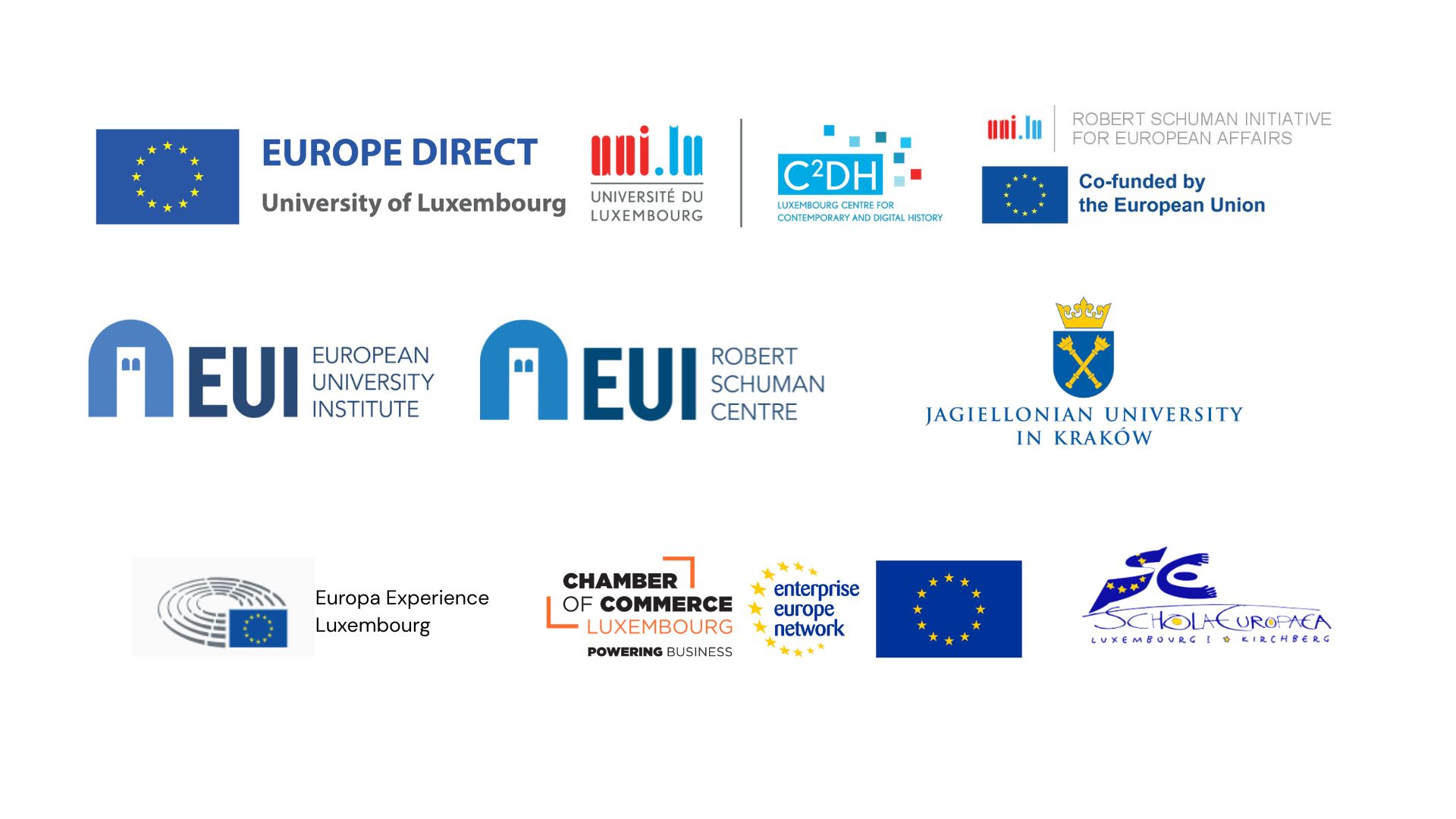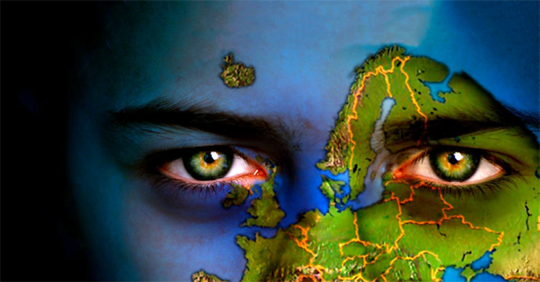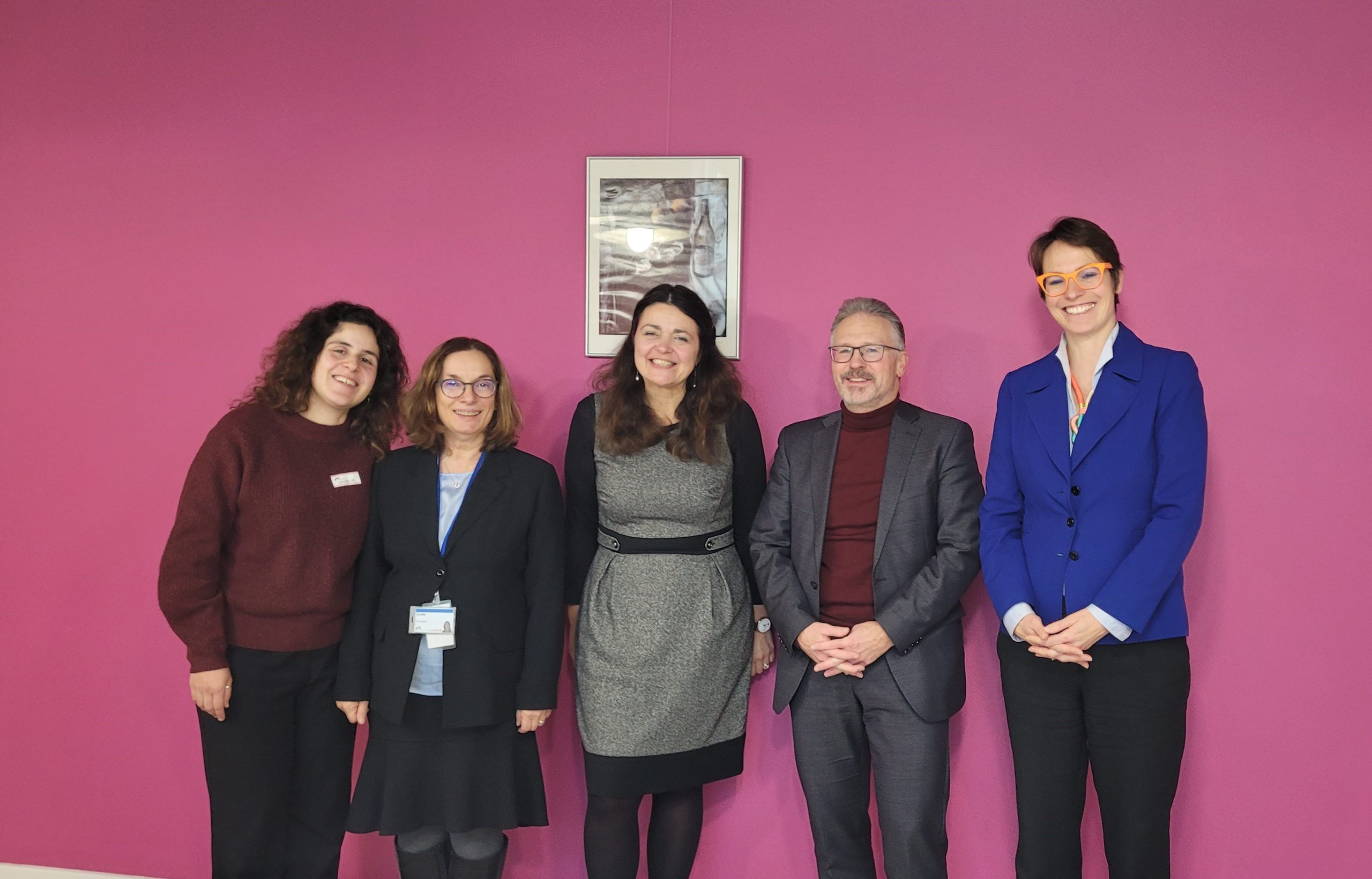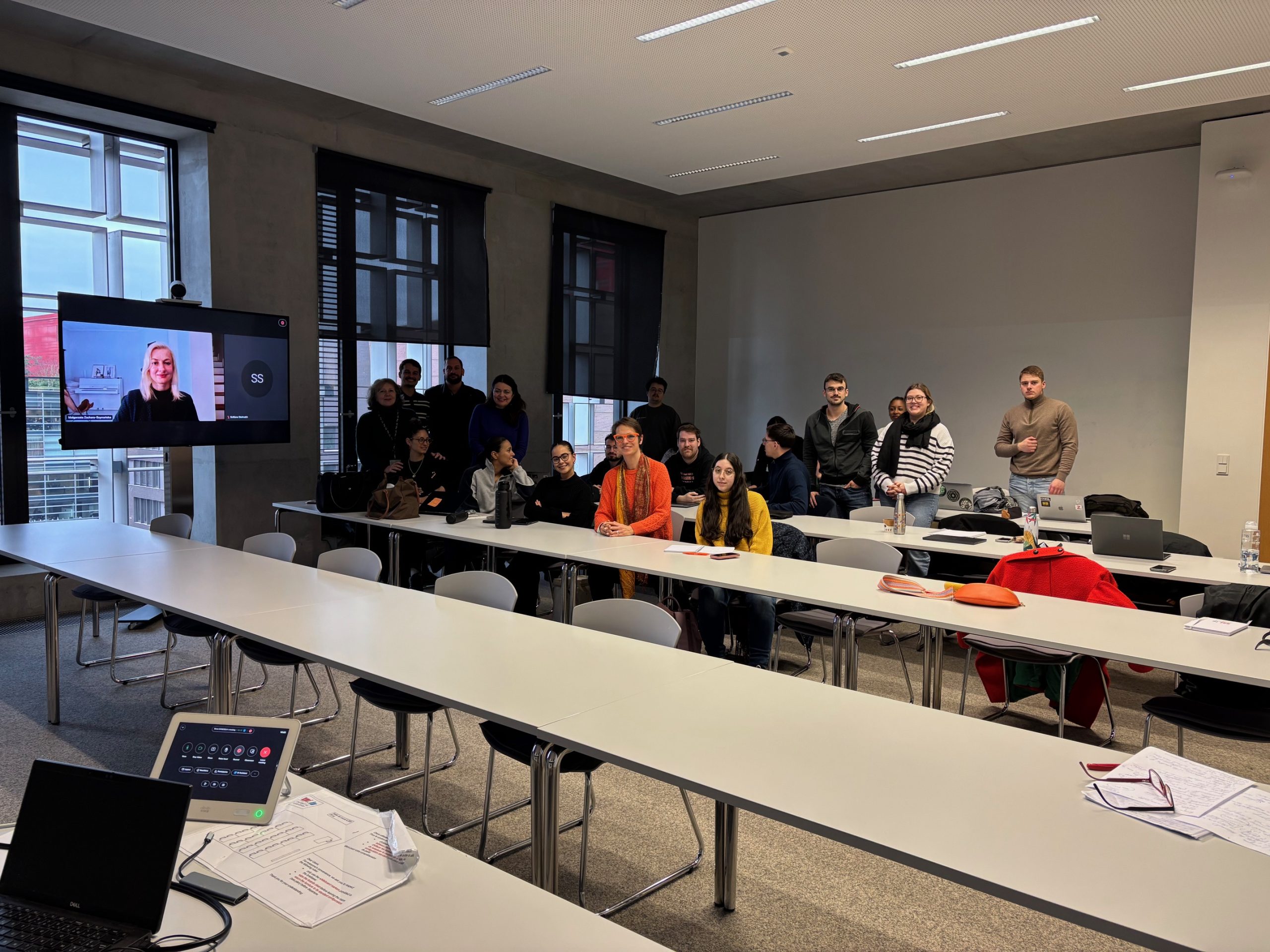2025 edition Winter (Online) Lecture Series on Europe at the University of Luxembourg
under the aegis of the Robert Schuman Centre for Advanced Studies, European University Institute (EUI Florence)
Rethinking Resilience: Expanding Perspectives, Deepening Understanding
Insights from Jean Monnet Fellows at the Robert Schuman Centre for Advanced Studies, European University Institute (EUI Florence)
The sixth edition of the Winter (Online) Lecture Series on Europe (WOLS 2025) will take place at the University of Luxembourg from 1 to 17 December 2025 in connection with the courses “History of European integration (1919-1993)” (MAHEC-142) and “Economic and social history of Europe after 1945: concepts, processes, actors” (MAHEC-63) from the Master in European Contemporary History, and the course “Democratic transitions in Central and Eastern Europe” (BCE-EU-301-04) from the Bachelor in European Cultures.
The aim is to give students on these programs, as well as the wider academic community at the University of Luxembourg, the opportunity to find out about the history and workings of the European institutions in Luxembourg from new and unconventional angles and to discuss some of the milestones in contemporary European history with people who were involved in or witnessed these events. Each session (in English, with a Q&A session in French and English) will be streamed via Webex and will include a presentation by a speaker followed by a discussion with the audience and the opportunity to ask questions.
The lectures, which are also open to the wider public, are run in conjunction with Europe Direct at the University of Luxembourg (ED-UNILU) – a competitive European public history project co-funded by the European Union (2021-2025) –, the Robert Schuman Initiative for European Affairs at the University of Luxembourg (RSI) – a Jean Monnet Centre of Excellence (JMCE) for the study of European integration and the European Union –, which also financially supports the lectures, and several other partners including: the European University Institute (EUI) (Florence, Italy), Robert Schuman Centre for Advanced Studies at the EUI Florence, Florence School of Transnational Governance (Florence, Italy), University of Padova (Italy), Jagiellonian University (Krakow, Poland), Europa Experience Luxembourg, Chamber of Commerce Luxembourg, Entreprise Europe Network Luxembourg, European School Luxembourg I – Kirchberg.
Titled “Rethinking Resilience: Expanding Perspectives, Deepening Understanding”, the WOLS 2025 builds on the following observations:
1). Resilience is multidimensional and evolving concept. “Resilience” is crucial for understanding systems exposed to disturbances . Originally formulated in the material sciences as the capacity of a body to regain its shape after a shock, it was later applied to ecology to describe a system’s ability to absorb disturbances while maintaining its structure and functions (Holling, 1973). Since then, the concept has expanded into and across multiple disciplinary fields, including psychology, sociology, history, anthropology, engineering, economics, cultural studies, gender studies, etc, leading to multiple and sometimes divergent conceptualizations (Martin-Breen & Anderies, 2011).
2). Historical context shapes resilience. In an era characterized by polycrisis—including the 2008–2018 financial crisis, the COVID 19 pandemic, the war in Ukraine, and ongoing socio-economic and environmental disruptions—resilience is increasingly understood not only as restoration but as the capacity for adaptation and transformation. Interdisciplinary perspectives show that this capacity depends on historical and cultural factors, such as collective memory, institutional practices, and social infrastructures, as well as on social stratifications that shape how different groups experience and respond to crises (Ossewaarde et al., 2021; Juncos & Bourbeau, 2022).
3). Forging digital resilience means anticipate, reflect, adapt. The digital and AI transformation reshapes resilience by transcending technological, social, and cultural boundaries, while supporting the preservation and transmission of knowledge, collective memory, and informed decision-making (Mandolesi, 2023). While critical infrastructures and socio-technical networks must absorb shocks while remaining adaptive, the digital dimension can simultaneously enhance adaptive responses, introduce new vulnerabilities, and trigger epistemic transformations by reshaping how knowledge about risks and decisions is produced, validated, and shared. (Neuberger et al., 2023; Aslama et al., 2024).
4). Exploring resilience through broadened perspectives. History has shown that resilience is dynamic and relational, emerging from interactions among institutions, communities, and individuals, and requiring continuous learning and adaptation. It is therefore only through cross-disciplinary research, knowledge creation, and dialogue among diverse actors and intellectual perspectives that we can deepen our understanding of the mechanisms sustaining resilient systems (Nisioti et al., 2023; Mordechai, L., & Haldon, J. 2024).
Drawing on these insights, the WOLS 2025 aims to foster dialogue and knowledge sharing on emerging conceptual approaches, challenges, and transformations shaping contemporary understandings and practices of resilience.
The WOLS 2025 will feature the following sessions:
The conference will be in English.
Chair and discussant: Dr Elena DANESCU
Guest lecturer: Dr Laura RAHM
Short biographies:
Laura RAHM is a Political Sociologist and Associate Researcher at the Centre for Population and Development in Paris. She holds a PhD in Political Demography and Sociology from Sorbonne University, where she lectured on Population, Development, and the Sustainable Development Goals (SDGs). She previously held a Jean Monnet Fellowship at the Robert Schuman Centre for Advanced Studies at the European University Institute and was a Marie Skłodowska-Curie Global Research Fellow. Her main research focuses on global governance and gender studies. She has worked extensively on knowledge transfer, sustainable development, and public policies related to gender, population, and health, and has published widely in international journals. Currently, as a Policy Leader Fellow at the School for Transnational Governance (EUI, Florence), Dr RAHM is implementing a project titled “Reimagining Accountability: A Forward-Thinking Framework for Measuring Gender Equality.”
Elena DANESCU is a Research Scientist at the Luxembourg Centre for Contemporary and Digital History (C²DH). She is a member in the Contemporary European History research group and is accredited to supervise PhD candidates within the Doctoral School in Humanities and Social Sciences. Her research, teaching and publications focuses on contemporary European history, European integration, EMU, history of economic thought, oral history, the role of women in diplomacy. She is an elected member of: the University Council (2018-2023 and 2023-2028), the Board of the Fondation du Mérite européen and the Council of the Fondation Jean Monnet pour l’Europe. She’s also in charge of Europe Direct University of Luxembourg – a competitive public history project co-funded by the European Union (2021-2025) and a founding fellow of the Robert Schuman Initiative for European Affairs. In 2020, she was awarded the Fernand Braudel Senior Fellowship at the European University Institute (EUI), and in 2024, she received a Jean Monnet Fellowship at he Robert Schuman Centre for Advanced Studies (RSCS) for the interdisciplinary research project “The Female Face of the EU.”
Abstract:
Feminist resilience is the capacity to adapt and thrive in the face of adversity, drawing strength from feminist principles and collective action to challenge and transform oppressive systems. This lecture explores feminist resilience as both a historical and contemporary force shaping Europe’s social and political evolution. It examines how feminist resilience has evolved through time and amid 21st century challenges—from pandemics and war to democratic backsliding and
backlash against women’s rights. Beginning with women’s often-overlooked contributions to the post-1945 project of European integration, the lecture revisits the “mothers of Europe” whose work and activism helped lay the foundations for a more social and democratic Europe—yet whose legacies remain overshadowed by narratives focused on the “founding fathers.” It explores the diverse strategies and coping mechanisms mobilized by feminist actors in the face of gender backlash and funding restrictions—ranging from stealth feminism and moderating gender language to reinforcing feminist discourse. It considers what these adaptive strategies reveal about power, agency, and resilience. Drawing lessons from policy, politics, and the pandemic, the lecture reflects on what a new age of feminist resilience might mean for Europe’s future—and how future historians will interpret this pivotal moment in the struggle for gender equality.
Click here for the lecture recording (password: XwVNK3Kt)
The conference will be in English.
Chair and discussant: Dr Elena DANESCU
Guest lecturer: Prof. Valentina VADI
Short biographies:
Valentina VADI is an Associate Professor of International Law at the School of Political Science, Law, and International Studies of the University of Padua, Italy. She formerly held positions at the University of Florence, Lancaster University, and Maastricht University. She also was recently a Jean Monnet Fellow at the Robert Schuman Centre for Advanced Studies of the European University Institute (2024–2025) and a Michigan Grotius Senior Research Fellow at Michigan Law School (2019). Her research focuses on public international law, international investment law, and cultural heritage. She has published over 100 articles and other contributions, including books such as Proportionality, Reasonableness and Standards of Review in International Investment Law and Arbitration (Edward Elgar, 2018), War and Peace: Alberico Gentili and the Early Modern Law of Nations (Brill, 2020), and Cultural Heritage in International Economic Law (Brill, 2023).
Elena DANESCU is a Research Scientist at the Luxembourg Centre for Contemporary and Digital History (C²DH). She is a member in the Contemporary European History research group and is accredited to supervise PhD candidates within the Doctoral School in Humanities and Social Sciences. Her research, teaching and publications focuses on contemporary European history, European integration, EMU, history of economic thought, oral history, the role of women in diplomacy. She is an elected member of: the University Council (2018-2023 and 2023-2028), the Board of the Fondation du Mérite européen and the Council of the Fondation Jean Monnet pour l’Europe. She’s also in charge of Europe Direct University of Luxembourg – a competitive public history project co-funded by the European Union (2021-2025) and a founding fellow of the Robert Schuman Initiative for European Affairs. In 2020, she was awarded the Fernand Braudel Senior Fellowship at the European University Institute (EUI), and in 2024, she received a Jean Monnet Fellowship at he Robert Schuman Centre for Advanced Studies (RSCS) for the interdisciplinary research project “The Female Face of the EU.”
Abstract:
This presentation examines how cultural heritage contributes to community resilience in the face of conflict, environmental change, and cultural suppression. Cultural heritage, both material and immaterial, is presented not just as memory, but as a living resource that supports identity and social cohesion. The analysis draws on several branches of international law, showing how global conventions protect and reinforce this role. These include frameworks on world heritage, cultural diversity, intangible heritage, Indigenous cultural rights, and underwater heritage. The study also connects heritage protection to broader areas of law, such as responses to cultural genocide, wartime protections, and environmental sustainability. Overall, it concludes that international law is increasingly recognizing cultural heritage not merely as something to preserve, but as a foundation of collective resilience and adaptive capacity.
Click here for the lecture recording (password: CmzxJiA5)
This study morning at the European School of Kirchberg will feature the Luxembourg premiere of the documentary entitled ‘’Cuddle or Die”, created and directed by Claire Bower. The screening will be followed by a debate with students and teachers, featuring the director Claire Bower, Dr. Laura RAHM, Prof. Valentina VADI, and Dr.Elena DANESCU.
Abstract of the documentary film “Cuddle or Die”, by Claire Bower:
Most people have heard of the term toxic masculinity , but what does an alternative look like? Cuddle or Die is a coming-of-age documentary that unfolds over seven days as a group of masculine-identifying youth embark on a ‘rite of passage’ wilderness expedition designed to nurture positive masculinity. Set in the Albertan countryside and the Rocky Mountains, the group is led by 28-year-old Jonathon, Youth Program Manager with Canadian nonprofit, Next Gen Men. At times, the suitability of “rites of passages” as a method for cultivating positive masculinity is called into question. The youths’ experiences are interwoven with interview footage from academics and staff from Next Gen Men who share their differing perspectives about the debates concerning engaging men and boys in the prevention of gendered violence. The film does not conclude with any specific call to action or “single solution”, but rather encourages those working in this area to reflect critically on their understandings of gender, masculinities and violence prevention.
Joint chair: Dr Elena DANESCU, Martin WEDEL, Director of the European School Luxembourg 1–Kirchberg and Elina CHRYSTALLA, teacher at the European School Luxembourg 1–Kirchberg
Discussants: Claire BOWER, Dr Laura RAHM, Prof. Valentina VADI, Dr Elena DANESCU
Short biographies:
Claire BOWER is an Australian gender-based violence prevention practitioner and documentary film maker. She holds a Master in Critical Gender Studies from Central European University. Her thesis, an ethnography of a Canadian not-for-profit working to promote positive masculinity, forms the basis of her first feature length documentary, Cuddle of Die. She has produced other short documentaries including Unboxing Gender, which premiered at the Queer Shorts Vienna 2023 film festival, and Somos Las Masculinidades Diversas. Claire Bower’s research explores the creation and use of audiovisual media to advance critical studies of men and masculinities, support the prevention of gender-based violence, and translate academic ideas into educational tools that can change meaning and understanding at a societal level.
Laura RAHM is a Political Sociologist and Associate Researcher at the Centre for Population and Development in Paris. She holds a PhD in Political Demography and Sociology from Sorbonne University, where she lectured on Population, Development, and the Sustainable Development Goals (SDGs). She previously held a Jean Monnet Fellowship at the Robert Schuman Centre for Advanced Studies at the European University Institute and was a Marie Skłodowska-Curie Global Research Fellow. Her main research focuses on global governance and gender studies. She has worked extensively on knowledge transfer, sustainable development, and public policies related to gender, population, and health, and has published widely in international journals. Currently, as a Policy Leader Fellow at the School for Transnational Governance (EUI, Florence), Dr RAHM is implementing a project titled “Reimagining Accountability: A Forward-Thinking Framework for Measuring Gender Equality.”
Valentina VADI is an Associate Professor of International Law at the School of Political Science, Law, and International Studies of the University of Padua, Italy. She formerly held positions at the University of Florence, Lancaster University, and Maastricht University. She also was recently a Jean Monnet Fellow at the Robert Schuman Centre for Advanced Studies of the European University Institute (2024–2025) and a Michigan Grotius Senior Research Fellow at Michigan Law School (2019). Her research focuses on public international law, international investment law, and cultural heritage. She has published over 100 articles and other contributions, including books such as Proportionality, Reasonableness and Standards of Review in International Investment Law and Arbitration (Edward Elgar, 2018), War and Peace: Alberico Gentili and the Early Modern Law of Nations (Brill, 2020), and Cultural Heritage in International Economic Law (Brill, 2023).
Elena DANESCU is a Research Scientist at the Luxembourg Centre for Contemporary and Digital History (C²DH). She is a member in the Contemporary European History research group and is accredited to supervise PhD candidates within the Doctoral School in Humanities and Social Sciences. Her research, teaching and publications focuses on contemporary European history, European integration, EMU, history of economic thought, oral history, the role of women in diplomacy. She is an elected member of: the University Council (2018-2023 and 2023-2028), the Board of the Fondation du Mérite européen and the Council of the Fondation Jean Monnet pour l’Europe. She’s also in charge of Europe Direct University of Luxembourg – a competitive public history project co-funded by the European Union (2021-2025) and a founding fellow of the Robert Schuman Initiative for European Affairs. In 2020, she was awarded the Fernand Braudel Senior Fellowship at the European University Institute (EUI), and in 2024, she received a Jean Monnet Fellowship at he Robert Schuman Centre for Advanced Studies (RSCS) for the interdisciplinary research project “The Female Face of the EU.”
Photos from the study morning at European School Luxembourg 1
Photos: ©Europe Direct University of Luxembourg
The conference will be in English.
Chair and discussant: Dr Elena DANESCU
Guest lecturer: Prof. Małgorzata ZACHARA-SZYMAŃSKA
Short biographies:
Małgorzata ZACHARA-SZYMAŃSKA is a Professor of International Relations at Jagiellonian University in Krakow and was a Jean Monnet Fellow at the European University Institute in Florence. Her research focuses on social change, environmental sustainability, global governance, and political leadership. She is the author of Global Political Leadership: In Search of Synergy (Routledge, 2023) and To Grow or Not to Grow: Evolution of the Economic Paradigm as a Response to Climate Disruption (Palgrave Macmillan, 2020), and editor of Poland in Transatlantic Relations after 1989: Miracle Fair (Cambridge Scholars, 2017). A public academic, she contributes to print and online media, radio, and television, and co-produces the Wolna Amerykanka podcast with Vogue Magazine.
Elena DANESCU is a Research Scientist at the Luxembourg Centre for Contemporary and Digital History (C²DH). She is a member in the Contemporary European History research group and is accredited to supervise PhD candidates within the Doctoral School in Humanities and Social Sciences. Her research, teaching and publications focuses on contemporary European history, European integration, EMU, history of economic thought, oral history, the role of women in diplomacy. She is an elected member of: the University Council (2018-2023 and 2023-2028), the Board of the Fondation du Mérite européen and the Council of the Fondation Jean Monnet pour l’Europe. She’s also in charge of Europe Direct University of Luxembourg – a competitive public history project co-funded by the European Union (2021-2025) and a founding fellow of the Robert Schuman Initiative for European Affairs. In 2020, she was awarded the Fernand Braudel Senior Fellowship at the European University Institute (EUI), and in 2024, she received a Jean Monnet Fellowship at he Robert Schuman Centre for Advanced Studies (RSCS) for the interdisciplinary research project “The Female Face of the EU.”
Abstract:
The issue of resilience, which enables nations to respond effectively to security threats, is most often discussed in terms of resources and behavioral protocols (preparedness). This lecture will focus on the emotional components of resilience, which are crucial for the effective use of accumulated resources and collective knowledge in critical situations. Drawing on data related to the beliefs of fighting Ukrainians and Poles actively responding to the refugee crisis in 2022, the talk will explore the importance of emotions (compassion, sense of community, pride, or fatigue) as factors shaping the dynamics of resilience.
Click here for the lecture recording (password: Wi8zSExJ)
Photos from the lecture
Documentary visit on the premises and in-person conference reserved exclusively for the students of the courses “History of European integration (1919-1993)” (MAHEC-142) from the Master in European Contemporary History, and “Democratic transitions in Central and Eastern Europe” (BCE-EU-301-04) from the Bachelor in European Cultures.
Documentary visit on the premises of the Chamber of Commerce and research seminar reserved exclusively for the students of the course “Economic and social history of Europe after 1945: concepts, processes, actors” (MAHEC-63) from the Master in European Contemporary History.

References
Aslama Horowitz, M., Nieminen, H., Lehtisaari, K., & D’Arma, A. (Eds.). (2024). Epistemic Rights in the Era of Digital Disruption. Palgrave Macmillan.
Folke, C., Carpenter, S. R., Walker, B., Scheffer, M., Chapin, T., & Rockström, J. (2010). Resilience thinking: integrating resilience, adaptability and transformability. Ecology and Society, 15(4): 20.
Große, C. & Sundberg, L.eif (2025). Generative AI and digital resilience: a research agenda. Journal of Risk Research. DOI: 10.1080/13669877.2025.2539105 (Accessed 30 October 2025).
Holling, C. S. (1973). Resilience and stability of ecological systems. Annual Review of Ecology and Systematics, 4(1), 1‑23.
Juncos, A. E., & Bourbeau, P. (2022). Resilience, Gender, and Conflict: Thinking about Resilience in a Multidimensional Way. Journal of International Relations and Development, 25, 861–878. DOI: https://doi.org/10.1057/s41268‑022‑00279‑7 (Accessed 30 October 2025).
Mandolessi, S. (2023). The digital turn in memory studies. Memory Studies. Advance online publication. DOI: https://doi.org/10.1177/17506980231204201. (Accessed 30 Octobre 2025)
Martin‑Breen, P., & Anderies, J. M. (2011). Resilience: A Literature Review. Institute of Development Studies (IDS). Source: https://opendocs.ids.ac.uk/articles/report/Resilience_A_Literature_Review/26441968 (Accessed 30 October 2025)
Mordechai, L., & Haldon, J. (2024). Resilience in environmental history discourse: Past, present, and future? The American Historical Review, 129(4), 1420–1451.
Neuberger, C., Reinemann, C., & Schindler, J. (2023). The digital transformation of knowledge order: A model for the analysis of the epistemic crisis. Annals of the International Communication Association, 47(2), 180–201. DOI: https://doi.org/10.1080/23808985.2023.2169950 (Accessed on 30 October 2025).
Nisioti, E., Clark, C., Das, K. K., Ernst, N. A., Friedenberg, N. A., Gates, E., Lambros, M., Lazurko, A., Puzović, N., & Salas, I. (2023). Resilience—Towards an interdisciplinary definition using information theory. Frontiers in Complex Systems, 1. DOI: https://doi.org/10.3389/fcpxs.2023.1236406 (Accessed 30 October 2025).
Ossewaarde, R., Filatova, T., Georgiadou, Y., Hartmann, A., Özerol, G., Pfeffer, K., Stegmaier, P., Torenvlied, R., van der Voort, M., Warmink, J., & Borsje, B. (2021). Review article: Towards a context‑driven research: a state‑of‑the‑art review of resilience research on climate change. Natural Hazards and Earth System Sciences, 21, 1119–1133. DOI: https://doi.org/10.5194/nhess-21-1119-2021. (Accessed 30 October 2025).
Tim, Yenni & Leidner, Dorothy E. (2023). Digital Resilience: A Conceptual Framework for Information Systems Research. Journal of the Association for Information Systems, 24(5), 1184–1198. DOI: 10.17705/1jais.00842 (Accessed 30 October 2025).







